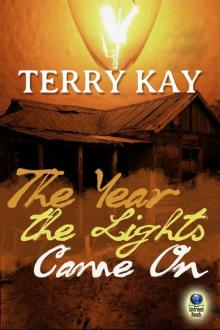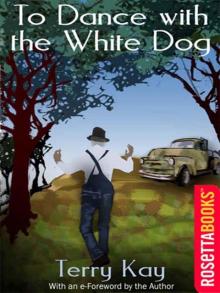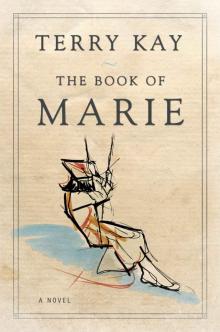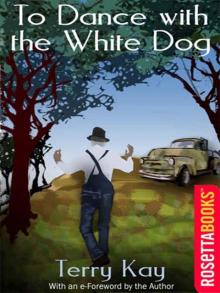To Dance With the White Dog Read online
To Dance with the White Dog
A Novel of Life, Loss, Mystery and Hope
Terry Kay
Copyright
To Dance with the White Dog
Copyright ©1990 by Terry Kay
Cover art to the electronic edition copyright © 2010 by RosettaBooks, LLC
This is a work of fiction. Names, characters, places and incidents are products of the author’s imagination or are used fictitiously. Any resemblance to actual events or locales or persons, living or dead, is entirely coincidental.
All rights reserved, including the right to reproduce this book or portions thereof in any form whatsoever.
First electronic edition published 2010 by RosettaBooks LLC, New York.
ISBN Mobipocket edition: 9780795310836
This book is dedicated with love to my sisters and brothers—Lula, Jean, Sara, Nell, Betty, Toombs, Patsy, Peggy, John and Gary—who saw the white dog dance; also, to the memory of our brother, Thomas, who has been for me the hero of wonderful legends which exist inexplicably, yet vividly, in my imagination.
Foreword
I have always considered the writing of “To Dance with the White Dog” to be something of an accident – if the first definition of the word as it pops up on my Encarta World English Dictionary is correct.
This is the way it is put:
accident n
1. the way things happen without any planning, apparent cause, or deliberate intent.
On the first day of the first word of the first draft, I did not have a plan, or a cause, or a deliberate intent.
Well, a cause, perhaps. A small one – if you again take Encarta’s first definition, which is:
cause n
1. something that, or somebody who, makes something happen or exist or is responsible for a certain result.
That cause was a letter from a friend named Joe Beck who had read a story I had written about a white dog, an assignment from my most enduring friend, Lee Walburn, then editor of the Atlanta Weekly, a magazine supplement of the Atlanta Journal-Constitution.
Joe’s letter said it was a nice story, a good read, but I had made a mistake: it was a novel, not a magazine piece.
When I read his letter, I knew intuitively he was right, and I went to my typewriter (yes, typewriter) and typed a sentence, the first sentence: He understood what they were thinking and saying: Old man that he is, what’s to become of him?
I do not know why that sentence rested on my fingertips, but it did, and in that moment I had some understanding of what an epiphany must be, for in that moment I knew the book wholly, knew its story, knew its characters, knew its rhythm. I knew the sound of it, and, for me, when a story has its own sound it becomes music in search of lyrics.
I wrote the book in two months and sent it to my agent, who is not a man given to hyperbole (unless, of course, the contract is major). His name is Harvey Klinger. He is something of a hybrid, a man with an agent’s soul and an editor’s brain, and such a condition can be baffling to a writer. I’ve had my bouts with him – losing most of them, but winning on occasion.
When Harvey responded to the story, he said he was impressed, said it was lovely, tenderly written. He then said he thought it would be a hard sell in New York, because it would be a risky project. I took his explanation to mean the story did not fit literary expectations of that time, and I understood his warning. Even then I realized that writers residing in the South were expected to offer dysfunction in the tales they created, and “To Dance with the White Dog” is as void of dysfunction as a children’s nursery rhyme sanitized by the Puritans.
Harvey did tell me he would circulate the manuscript, but I should not hold out hope for it among New York publishers.
He was right. No one accepted it. The letters of rejection had praise for the story and for the writing, yet no one wanted to take a chance. (The only solace I’ve had about that experience is having representatives of some of the houses admit to me privately, “We made a mistake.”)
It was then that a copy was sent to Margaret Quinlin of Peachtree Publishers in Atlanta. After her reading, she called and offered to send a contract to my home by taxi.
I informed Harvey.
A few days later I signed the contract.
Truthfully, I was never anxious over the publication of the book. I had decided it would be enough to go to the copying place and have several sets produced – enough for my siblings and for my children. Even when the book was released, I did not expect much of it.
And then a few things fell into place, as fortune is called in my home region of Georgia.
The first lady in line at my first signing session bought ten copies, loudly and proudly declaring that her entire Christmas budget went into the purchase, and that she knew enough about the book to know that nothing in it would insult anyone. People began to step out of line to pick up more copies, and on that night, it became a gift book.
Paul Harvey gave it an enthusiastic blurb on his national radio show. It won a prestigious award from the Southeastern Library Association. Reviews were favorable, some excessively so. I have a framed personal letter of praise from Archbishop Desmond Tutu.
And then came the movie. Hallmark Hall of Fame. Jessica Tandy and Hume Cronyn, their last film together. In 1993, it was the year’s most-watched television movie. Cronyn won an Emmy for his role as Sam Peek – the award coming on the day that Jessica Tandy died.
All of these moments are memorable for me. Yet, none of them compare to the personal letters I’ve received over the years from readers who confess that the story of Sam and Cora Peek, and the visitation of the strange white dog, revealed something meaningful to them – something about themselves.
When that happens, the story leaves the writer and becomes the property of the reader, and that is when the writing matters.
I like such accidents.
Terry Kay
December 2009
Contents
e-Foreword
1
2
3
4
5
6
7
8
9
10
11
12
13
14
15
16
17
18
19
20
21
22
23
24
25
Author’s Note
1
He understood what they were thinking and saying: Old man that he is, what’s to become of him? Let’s talk it out, they were saying cautiously.
Let’s talk it out and come up with some solution while we’re here, all of us, and it’s on our minds. See if we can approach him about it, reason with him even if the timing’s bad.
Makes sense. Can’t put it off forever, no matter how painful it’ll be to say aloud.
I don’t know. Not now. Can’t we wait? Just a few days, maybe.
But he’ll not make it being alone, not likely, not half-crippled as he is.
Not used to being alone, they were saying. Not at all.
That’s true. That’s true. Always been somebody else around, even with all of us taking our leave, one by one.
She was here. When we were all gone, at least she was here.
Yes, that’s true. Won’t be the same now, not at all, not without her. Something’ll have to take up the slack.
What are we going to do? We can’t say anything, not now.
Soon. We’ve got to, soon.
He’ll be stubborn about it, whatever we think.
He’s got pride, all right. It’s his mark. Thinks he’s still bull
-strong, and it’s sad.
Still that way in his mind—bull-strong.
They were saying these things about him and did not know that he understood them, that he knew what they were saying. They were whispering among themselves that an old man’s mind plays tricks, that it feeds on the swill of illusion, like carnival shell games that are faster than the eye. They were saying it would be a great pity to see him that way.
It was now past midnight. They had arrived—his sons and daughters—in the afternoon and during the hours of the dark May evening, and they had embraced him and wept before him and then they had huddled around the large kitchen table to drink strong coffee and talk quietly among themselves in sad, worried voices.
They would not know it, but he understood what they were thinking and saying: Old man that he is, what’s to become of him?
He sat alone in his padded rocker in the middle room, near his rolltop desk, his good leg propped on the bottom brace of his aluminum walker, his head against the pillowed headrest of the chair, his eyes closed. He was not asleep, but he pretended sleep. It was better that way. He wanted his sons and daughters to get it said. Maybe by saying it, they’d get over it and wouldn’t hover over him as though he was an invalid.
He knew about hovering. He had been called home from Madison, from school, to care for his grandfather when he was seventeen and he’d hovered, watching his grandfather wither into death. He had not wanted to stay with his grandfather, but it was expected and he’d done it. He’d hovered, watching, watching. He did not want his children to be watching, watching.
They mean well enough, he thought. And they need to talk of something. They need to feel needed. They would not bicker, though. It was not the time or the place or the mood for bickering. Not now. Perhaps later, when they had stopped their pitying. And perhaps they should. They had tempers for it, each of them—temper and his pride (and hers). It would not be enough for any of them to give up an argument without their say. God knows, he thought, I’ve listened to them for more than fifty years, and they’ve never backed off without having their say. But they mean well, sitting there in the kitchen, drinking their strong coffee at the crowded table, talking of what would become of him.
The window beside his roll-top desk was open and he could smell the greening of spring and hear the squalling of swamp bugs, and clearer than the swamp bugs and the low, serious voices of his children from the kitchen, he could hear the sharp, spirited whistle of a whippoorwill below the barns. He opened his lips slightly, moistened them, drew in a breath and soundlessly answered the whippoorwill. She had liked him answering birdcalls—the whippoorwill, the bobwhite. In spring and in summer, at dusk, they had often sat on the screened-in sideporch and listened to the birds, and he had answered them, cry for cry, and it had pleased her to hear him playful after a day of field work. Sometimes the bobwhites would walk into the grass of the lawn when he whistled for them and she would whisper, “Look!” She would not permit anyone to kill the bobwhites that lived in the grainfields of their land. The bobwhites were too trusting, too easy to call up for the gunsights of a hunter.
Because of her, he had learned to look for the birds—the darting flight of wild canaries (yellow sun on yellow wings), the chesty preening of redbirds and bluebirds, the blackbird with the red-tipped wings like startling epaulets. Often he had strewn grain over the ground outside the kitchen window so she could see the birds feeding as she worked.
The grass of the lawn had been cut earlier that day by one of the sons-in-law off work, and the smell of the cut grass, through the window beside the roll-top desk, was sweet as mint.
He reached for a letter on the desk. It was an invitation to a reunion for the classes of 1910–1915 at Madison Agricultural and Mechanical—Madison A&M. Sixty years, he thought. Sixty years. The invitation had arrived that day. She had said, “I want to go to this. It’s been a long time since we went back.” And he had taken the letter and put it away on his desk. He had said to her, “We’ll see about it.” He read the letter again in the dim light of the table lamp. It was signed by Martha Dunaway Kerr. He put the letter back on his desk and nestled his neck against the pillowed headrest and closed his eyes again.
He could hear the footsteps of someone—perhaps two people—entering the middle room from the kitchen, but he did not open his eyes. The footsteps stopped at the door. There was a pause of silence, and he knew he was being watched. Then he heard the soft, backward steps of retreat. He knew what was being said inside the kitchen: “He’s sleeping.” And he knew someone (one of the daughters, likely) answered: “Let him. He needs it.”
Curious, he thought—knowing there was someone, perhaps two people, at the door leading into the room, knowing exactly where they were standing as they watched him, knowing they had walked back to the kitchen table. Or was it curious? No, he decided. No. It was his house. He knew it board by board, could hear the voices of its timbers and walk its walls in blind dark, reading its raised-lettered Braille with his fingertips.
He had walked the walls many times at night, going to her bed to see if she was sleeping, but he would not go to her bed this night. No, not this night.
He opened his eyes, felt them dampen. He moved his head on the headrest of the chair. He could feel the ache in his bad leg, in the thigh, in the hip that had been twice replaced with an artificial joint. One of his daughters (he could not remember which) had given him aspirin for the ache, but it had not helped. Tomorrow he would ask for something stronger from the druggist, something to numb the bruise deep in his hip, something pleasant to calm him, to keep him from reeling before the dizzying swarm of sons and daughters and grandsons and granddaughters and drawn-faced neighbors who would fill the house with their mumblings and their platters of food offerings. The druggist was wise enough to know what was needed. The druggist would know better than anyone.
The whippoorwill called again, but was farther away, deeper in the swamp.
He pulled his watch from his shirt pocket. The watch was tied by a cut-off shoestring that he had threaded through a buttonhole high on his shirt—a practice that annoyed his daughters because it made him appear unkempt. It was twelve-forty. It does not take long to die, he thought.
He stared at the face of the watch, at the dull lime green of the see-in-the-dark numbers and the long and the short hands, and he subtracted away the hours in his mind. Five? Almost six? He counted the hours again. Yes, almost six, he decided. It had happened quickly. He slipped the watch back into his shirt pocket and closed his eyes again. From the kitchen, he could hear the mewing of crying.
I, too, want to die as quickly, he thought.
She did not answer when he called (though he could no longer hear all voices well, he had trained his senses for her, knew her quietest words) and he pulled himself from the oversized armchair, up to the top brace of the aluminum walker, and dragged-walked from the living room to find her.
“What’re you doing?” he said in a loud voice. “Thought you were coming back. Thought you wanted to see the show on the TV.”
She did not answer, and he went from the middle room to the kitchen and then to the back bedroom. He saw her on the floor, near the bed, on her left side, and he knew immediately what had happened. He shoved his walker aside and tried to run to her, but could not and he hobbled, good leg, bad leg, leaning against the walls for support until he reached her. He touched her neck. He could feel a quivering pulse, a twitch of blood flow, but he could not feel her breathing, and he sank beside her on his good leg and turned her to him and slipped his arm beneath the cradle of her neck and pushed open her mouth with his fingers and closed his own mouth over hers and began to search for life with his tongue, but there was only the cooling taste of saliva. He kissed her gently.
“Don’t,” he said aloud. “Don’t do this. Don’t do this.”
He knew he could not lift her and it angered him. Old damned body, he thought. Old damned body. He eased her head down and pulled his arm from beneath
her neck and rolled awkwardly and caught the knob of the closet door near him and drew himself up from the floor. The telephone was in the hallway and he stumbled, good leg, bad leg, to it and dialed a number. Four hundred yards away, across the sidelawn and a road, a daughter answered.
“It’s your mama,” he said.
“Mama?” his daughter asked, frightened. “Mama?”
He could not answer. He put the receiver back onto its rest and moved painfully back into the bedroom and sat on the side of the bed and looked down at her.
“Don’t do this,” he said again. “Don’t.”
He did not hear them entering the house and the room. He saw his son-in-law, worker-strong, lifting her and placing her on the bed beside him, and he knew the daughters—there were two living close and the one he called had called the other—were talking frantically, saying words to him that he did not understand or did not care to hear. And then there were men with a stretcher, and he could feel the muscled arm of another son-in-law helping him to his walker, and he was in the hospital where the antiseptic smell of medicines flowed into his senses and he was aware of other daughters, hastily called, and one of his sons.
His son led him to a chair near the bed and he sat, holding his son’s hand, and watched as his daughters approached her, leaned to her, whispered in small-child voices, “Mama? Mama?” And his son, the youngest of their children, a large, strong man, cried in a large, strong voice, like a prayer flung from his throat, “Old woman, I love you.” He could feel his son’s hand tighten in his hand. His son was sobbing.
He saw her push her head into the pillow and she opened her eyes and her lips parted, but she did not speak. Her eyes drifted across the faces of her children, then turned to him, held on him, closed. She swallowed once.
“Daddy?”
He opened his eyes and looked up. It was his oldest living son, who had driven the greatest distance in the dark May evening, across the mountains from Tennessee.

 The Year the Lights Came On
The Year the Lights Came On To Dance With the White Dog
To Dance With the White Dog The Book of Marie
The Book of Marie After Eli
After Eli To Dance with the White Dog: A Novel of Life, Loss, Mystery and Hope (RosettaBooks into Film)
To Dance with the White Dog: A Novel of Life, Loss, Mystery and Hope (RosettaBooks into Film)